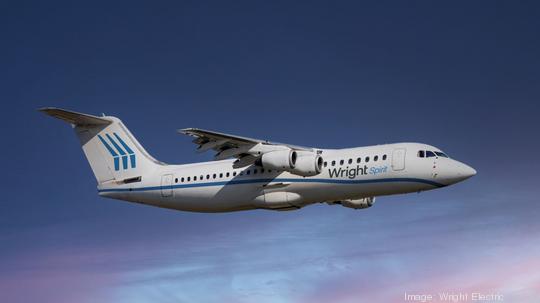
Wright Electric, a startup that’s developing electric engines for commercial jets, is establishing a physical headquarters in the Capital Region.
The startup is now in the process of outfitting a 6,000-square-foot space inside a larger building in the Saratoga Technology + Energy Park (STEP) in Malta, according to Jeff Engler, founder and CEO of the company. The space has been designed to accommodate high power and high voltage for testing motors and motor controllers.
Wright Electric was founded in Boston in 2016. Then it moved to San Francisco, Los Angeles and then came to the Capital Region about two years ago.
“There's a ton of talent in Albany, all focused on very specialized motors and motor controllers – and in the aviation industry, specifically,” Engler said. “There's a really good talent pool there, and some of our early engineers on our team had come from the Albany area, so we thought the best thing to do would be to build a team around them.”
Wright has 15 people full time and 10 part time, and is hiring for several technical roles, particularly in power electronics. The group of employees includes several GE veterans, many of them in the Capital Region.
Patrick Biel, formerly of Tokyo Electron and GE Global Research, is director of power electronics, according to LinkedIn. The director of operations is Elizabeth Wallace, who recently moved to the Capital Region after 24 years in Washington, D.C., after holding leadership roles at KGO Project Management and the National Wildlife Federation.
The startup is focused on commercial plans with 100 seats that travel on flights of about one hour. Planes of that size and larger account for 95-98% of carbon emissions in the industry, he said.
“There's a lot of people working on smaller airplanes. We felt that if we were going to try to make a difference in the space, we had to focus on larger airplanes," Engler said.

Engler previously co-founded Massachusetts-based medical device startup Podimetrics, which has raised $75 million to date, including $45 million in a series C round earlier this year. He has an MBA from Harvard Business School and a bachelor’s degree from Columbia University.
He said he started Wright as a way to help mitigate the large carbon footprint that comes from commercial aviation.
“To give you a sense of scale, you would have to eat vegetarian for over a year to offset the carbon from even a single round trip flight from New York to Chicago,” Engler said. “If you think about all the things that we do to make a difference – a single flight probably counteracts many of those things."
The majority of aircraft fuel savings come from more efficient engines, he said.
Wright's electric engines will go inside the four-engine BAe 146 aircraft, to be branded as Wright Spirit. The plan is to have the Wright-outfitted plane on the market by around 2026-27. There will be flight tests using one, two and four electric engines in 2023, 2024 and 2025, respectively.
The Wright aviation engine is about 10 times more powerful than the electric engine inside a Tesla, Engler said, and has specializations like being very lightweight and highly efficient. And the design is meant to create a much quieter product, he said.
“We developed our own, from scratch, motor and motor controller, that's one of the most powerful and power dense in the world."
The startup is now testing its first prototype at an undisclosed temporary external location. The plan is to move that testing into the new Saratoga County facility later this year.
Engler said the Wright Electric is developing the product with support from a number of airlines around the world, including EasyJet in Europe and Viva Aerobus in Latin America. Alongside partners including Honeywell and EaglePitcher, Wright is still determining which of multiple energy sources will power the engines.
“When we think about competition, we generally think about the status quo," Engler said. "The easiest thing for an airline to do is just to use their existing airplanes. The opportunity here is to reduce dramatically the global warming impact of aviation, and also the noise impact of aviation.”
The startup doesn’t disclose total fundraising amounts, but it has raised about $10 million from government grants and contracts through agencies such as NASA, the U.S. Army, the U.S. Air Force and the U.S. Department of Energy ARPA-E. The startup has also received a contract form the U.S. Air Force to turn the motor into an ultra lightweight generator.
Other funding has come from the Y Combinator startup accelerator, the Clean Energy Trust, venture funds and family offices.
The Y Combinator accelerator has helped launch more than 3,000 companies since 2005, including Stripe, Airbnb, DoorDash, Coinbase, Instacart, Dropbox, Twitch and Reddit, according to its website.
“We're fully funded for our existing operations,” Engler said.



